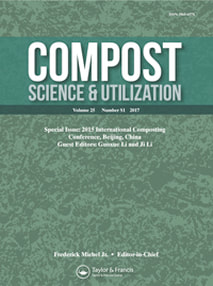 The Effects of Soil Solarization and Compost on Soil Suppressiveness against Fusarium Oxysporum f. sp. Melonis Compost Science and Utilization March 2017 Link Here Soil Solarization is a common low-cost process used to kill soil borne pests and pathogens. Soil is cultivated, moistened, and covered with clear plastic during hot summer months. The plastic covering collects heat from the sun, which is dissipated throughout the moist soil. The soil can heat to above 140F, killing disease causing organisms. Beneficial organisms have adapted to be able to withstand this heat. There are some issues, like whether or not the soil is able to get hot enough to actually do the job. In northern latitudes and coastal climates, the daytime temperatures may not suffice, which can actually exacerbate the problem. The A group of scientists in Jerusalem wanted to know if compost could help the process. In a simple experiment, melon seedlings were inoculated with fusarium spores and then planted in several soil conditions: non-solarized soil, solarized soil without compost, and solarized soil with compost. Interestingly, the researchers found the compost with non-solarized soil, provided the best resistance to fusarium. Compost with solarized soil was also beneficial. Since the melon seedlings were certainly exposed to the pathogen, the scientists concluded that solarization actually may be decreasing the microbial biomass enough so much that fusarium was able to become the dominant organism. With the addition of compost, the load of beneficial organisms was able to keep the fusarium in check, thereby reducing the disease occurrence. The take home lesson from this experiment is: if you solarize your soil, add compost in order to maintain a healthy population of beneficial microorganisms.
0 Comments
Your comment will be posted after it is approved.
Leave a Reply. |
Archives
June 2024
Categories
All
|
Contact Us
Why TeaLAB?TeaLAB is committed to helping people and their gardens to become more self- sufficient, healthier, and productive. Grow your sweetest corn, your biggest watermelon, your tallest quinoa, your tastiest tomato, and your happiest you.
TeaLAB was founded to teach people how to garden organically, so that we can become more closely connected with the land. Our goal has been to simplify growing methods so that gardeners have a positive experience in the garden. TeaLAB is where the garden meets the laboratory. From around the world and into your backyard, our products contain ingredients that are sourced both locally and globally. Using methods both ancient and cutting edge, TeaLAB promotes maximum biology. Grow with TeaLAB. |

 RSS Feed
RSS Feed
